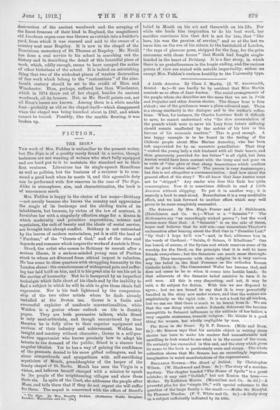FICTION.
THE SIGN.• THE work of Mrs. Fedden is unfamiliar to the present writer, but The Sign is of a quality rarely found in a novice, though instances are not wanting of writers who start f silly equipped and are hard put to it to maintain the standard set in their first ventures. Literature has its single-speech Hamiltons as well as politics, but the business of a reviewer is to com- mend a good book when he meets it, and this agreeable duty can be performed with few reserves in the case of The Sign. Alike in atmosphere, aim, and characterization, the book is of uncommon merit.
Mrs. Fedden is happy in the choice of her scene—Brittany —not merely because she knows the country and appreciates the magic of its landscape and the abiding traits of its inhabitants, but because, by virtue of the law of contrast, it furnishes her with a singularly effective stage for a drama in which modernity and primitive superstition, science and mysticism, the cult of beauty and the ideals of social service, are brought into abrupt conflict. Brittany is not untouched by the leaven of modern materialism, yet it is still the land of " Pardons," of the " Guests of God," and of the rites and legends and romance which inspire the works of Anatole le Braz.
Sturd, the artist who comes to Brittany to recruit after a serious illness, is a serious-minded young man of Puritan stock to whom art divorced from ethical import is valueless. Re has come to close quarters with struggling humanity in the London slums : the consciousness of widespread pain and suffer- ing has laid hold on him, and it is his great aim to use his art in the service of humanity. But he is hampered by an imperfect technique which falls short of his ideals and by the inability to find a subject in which he will be able to give those ideals full expression. Nor is his task lightened by the companion- ship of the two other artists whom he finds already installed at the Breton inn. Gower is a facile and successful exploiter of academic conventionalities, while Walden is a genius whose outlook on life is frankly pagan. They are both persuasive talkers, while Sturd Is only semi-articulate, and though unconvinced by their theories he is fully alive to their superior equipment and envious of their industry and achievement. Walden has insight and mastery without character; Gower is a self-pro- tective opportunist who knows precisely how to adapt his talents to the demand of the public; Sturd is a sincere but angular idealist. Yet he has a way of gaining the confidence of the peasants denied to his more gifted colleagues, and be alone comprehends and sympathizes with self-sacrificing mysticism of Monik, granddaughter of the keeper of the lonely chapel of St. Barge. Monik has seen the Virgin in a vision, and believes herself charged with a. mission to speak to the people of the neighbouring villages and show them their sin. In spite of the Cure, she addresses the people after Mass, and tells them that if they do not repent she will suffer for them. The sequel is concerned with the effect of Sturd's . The Sign. By Mrs. Romilly Fedden (Katharine Waldo Douglas). Loudon : Macmillan and Co. [Gs.] belief in Monik on his art and therewith on his life. For while she lends him inspiration to do his best work, her sacrifice convinces him that Art is not for him, that "like hers, his was the passion of service," and so at the last we leave him on the eve of his return to the battlefield of London, " the rags of glamour gone, stripped for the fray, for the grim encounter with those forces" that Monik had fought single- handed in the heart of Brittany. It is a fine story, in which there is no gratuitousness in the tragic ending, and the various points of view are stated with notable impartiality, unless we except Mrs. Fedden's curious hostility to the University type.






































 Previous page
Previous page